>First, We’ve Discovered That About A Quarter Of All The Internet Connection In Or Out Of The House
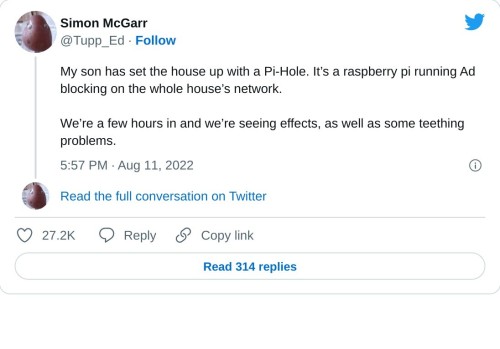
>First, we’ve discovered that about a quarter of all the internet connection in or out of the house were ad related. In a few hours, that’s about 10,000 out of 40,000 processed.
>We also discovered that every link on Twitter was blocked. This was solved by whitelisting the https://t.co domain.
>Once out browsing the Web, everything is loading pretty much instantly. It turns out most of that Page Loading malarkey we’ve been accustomed to is related to sites running auctions to sell Ad space to show you before the page loads. All gone now.
>We then found that the Samsung TV (which I really like) is very fond of yapping all about itself to Samsung HQ. All stopped now. No sign of any breakages in its function, so I’m happy enough with that.
>The primary source of distress came from the habitual Lemmings player in the house, who found they could no longer watch ads to build up their in-app gold. A workaround is being considered for this.
>The next ambition is to advance the Ad blocking so that it seamlessly removed YouTube Ads. This is the subject of ongoing research, and tinkering continues. All in all, a very successful experiment.
>Certainly this exceeds my equivalent childhood project of disassembling and assembling our rotary dial telephone. A project whose only utility was finding out how to make the phone ring when nobody was calling.

>Update: All4 on the telly appears not to have any ads any more. Goodbye Arnold Clarke!
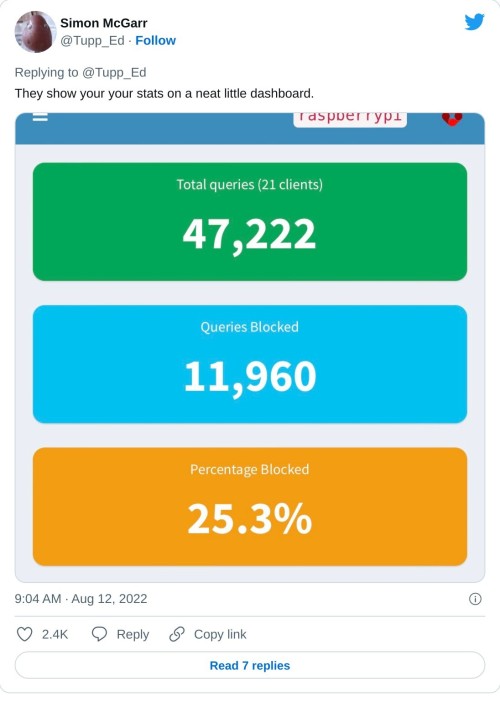
>Lemmings problem now solved.
>Can confirm, after small tests, that RTÉ Player ads are now gone and the player on the phone is now just delivering swift, ad free streams at first click.
>Some queries along the lines of “Are you not stealing the internet?” Firstly, this is my network, so I may set it up as I please (or, you know, my son can do it and I can give him a stupid thumbs up in response). But there is a wider question, based on the ads=internet model.
>I’m afraid I passed the You Wouldn’t Download A Car point back when I first installed ad-blocking plug-ins on a browser. But consider my chatty TV. Individual consumer choice is not the method of addressing pervasive commercial surveillance.
>Should I feel morally obliged not to mute the TV when the ads come on? No, this is a standing tension- a clash of interests. But I think my interest in my family not being under intrusive or covert surveillance at home is superior to the ad company’s wish to profile them.
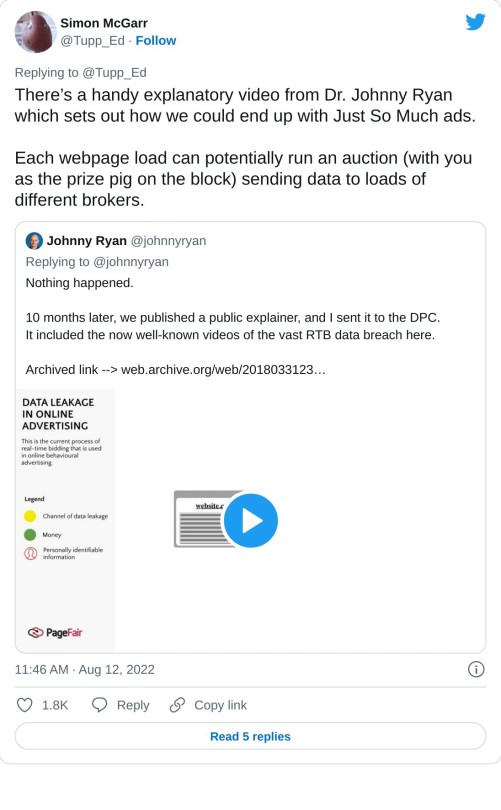
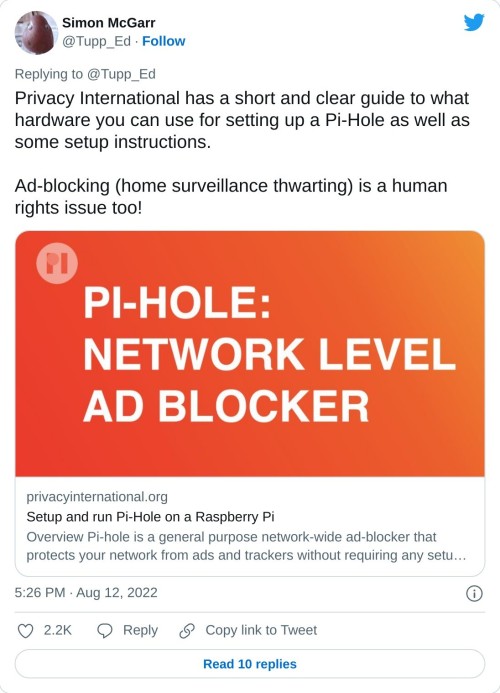
>Aside: 24 hours of Pi Hole stats suggests that Samsung TVs are very chatty. 14,170 chats a day.
>YouTube blocking seems difficult, as the ads usually come from the same domain as the videos. Haven’t tried it, but all of the content can also be delivered from a no-cookies version of the YouTube domain, which doesn’t have the ads. I have asked my son to poke at that idea.
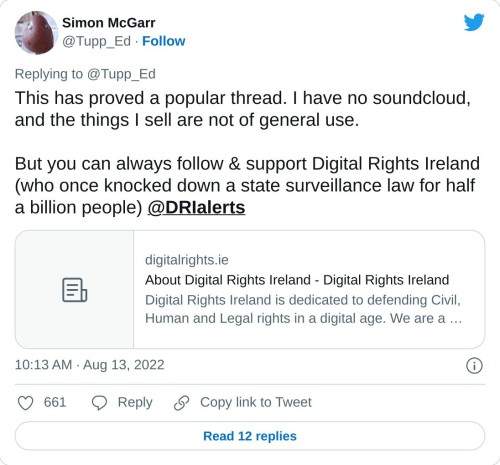
More Posts from Sun-rush and Others
One piece of acting advice that has stayed with me for years in regards to both writing and drawing as well is: "Don't use the body to act what the character is saying. Act what the character is THINKING."
Like, as a very, very basic example: a character is apologizing by saying, "I'm sorry." But that line is going to look and sound different depending on what the character is thinking. Crossed arms and a sullen tone can mean that a character is actually thinking: "I don't mean it and also I hate you." A pleading tone and reaching out to take the other character's arm can mean: "Please don't leave me." A tired voice and slumped shoulders within context could mean: "I did what I had to do."
This is one way to begin to do "Show, Don't Tell" in storytelling. It is trusting your audience to see the depth and to catch on to the things you leave unsaid. It's fun to let the audience be observant and clever. It is also reflective of real life, where people are often scared of being vulnerable, or don't necessarily even understand their own emotions, or can't articulate their own thoughts, or have difficulty identifying the true feelings of the people around them, and so don't say very much.
There are exceptions to this advice, of course. In writing especially, rather than in a visual medium, some POV characters are very good at reading emotions from body language and others are not, and their observations in the narration may reflect this skill. Some characters will assume everyone around them is always angry with them or simply not pay attention to other people's moods at all, personalities which can also be subtly communicated to the audience and later used in the story in some interesting way.
Some characters have excellent control over their body language and tone of voice, because they are on-guard, highly trained in some fashion, or a very good liar. They will not easily communicate their true thoughts through their body language or their actions. Their lie can be so good that it can be slipped past the audience as nothing important to the plot until it comes back to bite. Their oddly perfect control over their body in a tense situation can instead maybe be used to indicate to the POV character and/or the audience: "Oh, there's something up with this person."
Body language will also change by culture and class and disability and so on. This clash can cause communication problems between characters, as a character's affectionate pat on the shoulder of another might be intended as casual comfort, but be received as overly intimate condescension. Different cultures / people can even have very different opinions on what level of eye contact and overlapping speech is rude.
This advice was originally given to me in the context of illustration and animation, in which it is very common for inexperienced artists to act out the words that the character is saying in mime-like gesture. In media for young children, we might choose to keep things very simple, as toddlers struggle to learn what it looks like and feels like to be angry or happy. But past that? People don't really behave this way. What we say and what we really mean are not always synchronized, and we can use the body to communicate this.
Things That May Be Causing Your Writer's Block- and How to Beat Them
I don't like the term 'Writer's Block' - not because it isn't real, but because the term is so vague that it's useless. Hundreds of issues all get lumped together under this one umbrella, making writer's block seem like this all-powerful boogeyman that's impossible to beat. Worse yet, it leaves people giving and receiving advice that is completely ineffective because people often don't realize they're talking about entirely different issues.
In my experience, the key to beating writer's block is figuring out what the block even is, so I put together a list of Actual Reasons why you may be struggling to write:
(note that any case of writer's block is usually a mix of two or more)
Perfectionism (most common)
What it looks like:
You write one sentence and spend the next hour googling "synonyms for ___"
Write. Erase. Write. Rewrite. Erase.
Should I even start writing this scene when I haven't figured out this one specific detail yet?
I hate everything I write
Cringing while writing
My first draft must be perfect, or else I'm a terrible writer
Things that can help:
Give yourself permission to suck
Keep in mind that nothing you write is going to be perfect, especially your first draft
Think of writing your first/early drafts not as writing, but sketching out a loose foundation to build upon later
People write multiple drafts for a reason: write now, edit later
Stop googling synonyms and save that for editing
Write with a pen to reduce temptation to erase
Embrace leaving blank spaces in your writing when you can't think of the right word, name, or detail
It's okay if your writing sucks. We all suck at some point. Embrace the growth mindset, and focus on getting words on a page
Lack of inspiration (easiest to fix)
What it looks like:
Head empty, no ideas
What do I even write about???
I don't have a plot, I just have an image
Want to write but no story to write
Things that can help:
Google writing prompts
If writing prompts aren't your thing, instead try thinking about what kind of tropes/genres/story elements you would like to try out
Instead of thinking about the story you would like to write, think about the story you would like to read, and write that
It's okay if you don't have a fully fleshed out story idea. Even if it's just an image or a line of dialogue, it's okay to write that. A story may or may not come out of it, but at least you got the creative juices flowing
Stop writing. Step away from your desk and let yourself naturally get inspired. Go for a walk, read a book, travel, play video games, research history, etc. Don't force ideas, but do open up your mind to them
If you're like me, world-building may come more naturally than plotting. Design the world first and let the story come later
Boredom/Understimulation (lost the flow)
What it looks like:
I know I should be writing but uugggghhhh I just can'tttttt
Writing words feels like pulling teeth
I started writing, but then I got bored/distracted
I enjoy the idea of writing, but the actual process makes me want to throw my laptop out the window
Things that can help:
Introduce stimulation: snacks, beverages, gum, music such as lo-fi, blankets, decorate your writing space, get a clickity-clackity keyboard, etc.
Add variety: write in a new location, try a new idea/different story for a day or so, switch up how you write (pen and paper vs. computer) or try voice recording or speech-to-text
Gamify writing: create an arbitrary challenge, such as trying to see how many words you can write in a set time and try to beat your high score
Find a writing buddy or join a writer's group
Give yourself a reward for every writing milestone, even if it's just writing a paragraph
Ask yourself whether this project you're working on is something you really want to be doing, and be honest with your answer
Intimidation/Procrastination (often related to perfectionism, but not always)
What it looks like:
I was feeling really motivated to write, but then I opened my laptop
I don't even know where to start
I love writing, but I can never seem to get started
I'll write tomorrow. I mean next week. Next month? Next month, I swear (doesn't write next month)
Can't find the time or energy
Unreasonable expectations (I should be able to write 10,000 words a day, right????)
Feeling discouraged and wondering why I'm even trying
Things that can help:
Follow the 2 min rule (or the 1 paragraph rule, which works better for me): whenever you sit down to write, tell yourself that you are only going to write for 2 minutes. If you feel like continuing once the 2 mins are up, go for it! Otherwise, stop. Force yourself to start but DO NOT force yourself to continue unless you feel like it. The more often you do this, the easier it will be to get started
Make getting started as easy as possible (i.e. minimize barriers: if getting up to get a notebook is stopping you from getting started, then write in the notes app of your phone)
Commit to a routine that will work for you. Baby steps are important here. Go with something that feels reasonable: every day, every other day, once a week, twice a week, and use cues to help you remember to start. If you chose a set time to write, just make sure that it's a time that feels natural to you- i.e. don't force yourself to writing at 9am every morning if you're not a morning person
Find a friend or a writing buddy you can trust and talk it out or share a piece of work you're proud of. Sometimes we just get a bit bogged down by criticism- either internal or external- and need a few words of encouragement
The Problem's Not You, It's Your Story (or Outline (or Process))
What it looks like:
I have no problems writing other scenes, it's just this scene
I started writing, but now I have no idea where I'm going
I don't think I'm doing this right
What's an outline?
Drowning in documents
This. Doesn't. Make. Sense. How do I get from this plot point to this one?!?!?! (this ColeyDoesThings quote lives in my head rent free cause BOY have I been there)
Things That Can Help:
Go back to the drawing board. Really try to get at the root of why a scene or story isn't working
A part of growing as a writer is learning when to kill your darlings. Sometimes you're trying to force an idea or scene that just doesn't work and you need to let it go
If you don't have an outline, write one
If you have an outline and it isn't working, rewrite it, or look up different ways to structure it
You may be trying to write as a pantser when you're really a plotter or vice versa. Experiment with different writing processes and see what feels most natural
Study story structures, starting with the three act structure. Even if you don't use them, you should know them
Check out Ellen Brock on YouTube. She's a professional novel editor who has a lot of advice on writing strategies for different types of writers
Also check out Savage Books on YouTube (another professional story editor) for advice on story structure and dialogue. Seriously, I cannot recommend this guy enough
Executive Dysfunction, Usually From ADHD/Autism
What it looks like:
Everything in boredom/understimulation
Everything in intimidation/procrastination
You have been diagnosed with and/or have symptoms of ADHD/Autism
Things that can help:
If you haven't already, seek a diagnosis or professional treatment
Hire an ADHD coach or other specialist that can help you work with your brain (I use Shimmer; feel free to DM me for a referral)
Seek out neurodiverse communities for advice and support
Try body doubling! There's lot's of free online body doubling websites out there for you to try. If social anxiety is a barrier, start out with writing streams such as katecavanaughwrites on Twitch
Be aware of any sensory barriers that may be getting in the way of you writing (such as an uncomfortable desk chair, harsh lighting, bad sounds)
And Lastly, Burnout, Depression, or Other Mental Illness
What it looks like:
You have symptoms of burnout or depression
Struggling with all things, not just writing
It's more than a lack of inspiration- the spark is just dead
Things that can help:
Forget writing for now. Focus on healing first.
Seek professional help
If you feel like it, use writing as a way to explore your feelings. It can take the form of journaling, poetry, an abstract reflection of your thoughts, narrative essays, or exploring what you're feeling through your fictional characters. The last two helped me rediscover my love of writing after I thought years of depression had killed it for good. Just don't force yourself to do so, and stop if it takes you to a darker place instead of feeling cathartic
The only character questionnaire you'll ever need (works for all characters and genres)
Name:
Role:
Physical description:
Age:
Personality Type:
Distinctive skills and abilities:
Greatest fear:
Misbelief about the world:
What happened to make them believe this lie:
What do they criticize others for:
Love Language:
How do they respond to emotional pain:
Top 3 things they value (physical or abstract):
Is there an object they can’t bear to part with and why:
Typical outfit:
Method of manipulation:
How are they dissatisfied with life:
What do they think will bring them happiness:
What could they do to make that happen:
How has their fear stopped them from taking this action:
How do they think they can get their goal without doing the thing that makes them afraid:
Answer for each character this character has a direct relationship with
Describe relationship briefly:
Points of conflict in relationship:
What do they agree on:
What do they disagree on:
Any secrets kept from each other and why:
How did they meet and how long did they know each other:
How will their relationship change over the course of the story:
YIPPEE
how to become commander of friend group
how to establish political control of friendgroup
friend group organisational structure google

Dark/Horror Genres List
Horror = The fiction of fear
Splatterpunk = Horror that relies on extreme violence and graphic gore
Extreme Horror = Seeks to create utmost terror in the reader.
Psychological Horror = The danger that comes from the human mind - sanity, guilt, boundaries between right and wrong, etc.
Dystopian = Fiction set in a stark, nightmarish kind of world, often in the near future.
Lovecraftian = Based on the concept that our world was once ruled by alien creatures who still exist out there.
Thriller = high suspense and anticipation.
Mystery
Dark Diction = Stories that disturb the reader by probing the boundaries between good and evil
Supernatural = People face manifestations outside of the normal human experience.
Paranormal = features characters who are "nearly" or "formally" human, like zombies, vampires, and weres.
Paranormal Romance
Dark Fantasy
Urban Fantasy = typically set in a run-down part of a modern city, these stories involve human characters with psychic/magical abilities.
Gothic
Erotic Horro
Horror Comedy
Romantic Suspense
Steampunk = a blend of sci-fi, fantasy and historical, often with elements of horror.
Ghost stories
Slipstream
Speculative Fiction = broad term encompassing the fantasy and sci-fi genres, as well as horror fiction with supernatural or paranormal elements.
Slice of Life = no obvious plot, but shows a snapshot from people's ordinary lives.
─── ・ 。゚☆: *.☽ .* . ───
💎If you like my blog, buy me a coffee☕ and find me on instagram!
💎Before you ask, check out my masterpost part 1 and part 2
💎For early access to my content, become a Writing Wizard
ive been re-reading your fics for literal YEARS and the joy and disbelief i experienced when i saw a post of yours on my tumblr again was overwhelming
AHHH thank you i'm so happy to hear that :'D hoping to add to those fics...except now i have to edit my masterlist again T-T
things to ask yourself when designing a female character:
how much blood is she covered in
are her eyes filled with madness
can she rip things to shreds with her fingernails

The Secret History by Donna Tartt

A Little Life by Hanya Yanagihara
if i was a popular minecraft youtuber id just tweet "hey guys stop drawing shipping fanart of me and my friends/coworkers, i only fucked one of them and seeing me paired with anyone else is kinda weird and crosses my boundaries" and then i'd turn my phone off
How to Craft a Compelling Morally Grey Character: A Step-by-Step Guide
Step 1: Define the Character’s Core Traits
Identify Strengths and Virtues: List positive traits that make the character likable or admirable. These could include bravery, intelligence, loyalty, or compassion.
Identify Flaws and Vices: List negative traits that add complexity and realism. These could include arrogance, selfishness, impatience, or a propensity for violence.
Step 2: Establish Motivations and Backstory
Create a Detailed Backstory: Develop a background that explains why the character has their particular mix of virtues and flaws. Consider their upbringing, significant life events, and personal experiences.
Determine Core Motivations: Identify what drives the character. Is it revenge, love, ambition, survival, or something else? Motivations should be realistic and relatable.
Step 3: Develop Moral Ambiguity
Set Up Moral Dilemmas: Place your character in situations where they must make difficult choices with no clear right or wrong answer. These dilemmas should challenge their morals and reveal their complexity.
Showcase Contradictions: Allow the character to make decisions that might seem contradictory. For example, they might commit a crime to protect someone they love, revealing both a moral and an immoral side.
Step 4: Create Dynamic Relationships
Construct Meaningful Relationships: Develop relationships with other characters that highlight different aspects of your morally grey character. These relationships can help explore their multifaceted personality.
Use Relationships to Drive Conflict: Relationships can be a source of moral conflict and development. Conflicts with friends, family, or rivals can push your character to reveal their grey areas.
Step 5: Show Consequences and Growth
Illustrate the Impact of Actions: Show the real-world consequences of the character’s morally ambiguous decisions. This adds realism and stakes to the story.
Allow for Character Growth: Let your character evolve. They might become more virtuous or more corrupt over time. This evolution keeps the character dynamic and interesting.
Step 6: Balance Sympathetic and Unsympathetic Traits
Make Them Relatable: Ensure the character has traits or experiences that the audience can relate to or sympathize with, even if they do questionable things.
Maintain Complexity: Avoid making the character too sympathetic or too unsympathetic. The balance between good and bad traits should make the audience feel conflicted about the character.
Step 7: Use Subtlety and Nuance
Avoid Clear Labels: Do not overtly label the character as good or evil. Allow their actions and motivations to speak for themselves.
Employ Subtlety: Use nuanced behavior and dialogue to reveal the character’s moral complexity. Avoid heavy-handed exposition.
Step 8: Test and Refine
Seek Feedback: Share your character with others and seek feedback on their complexity and believability. Adjust based on constructive criticism.
Refine Motivations and Actions: Continuously refine the character’s motivations and actions to ensure they remain compelling and consistent throughout the story.
Example: Crafting a Morally Grey Character
Core Traits:
Strengths: Intelligent, determined, loyal.
Flaws: Arrogant, manipulative, vengeful.
Backstory:
Grew up in a tough neighborhood, witnessing crime and corruption.
Lost a loved one to a gang, fueling a desire for revenge.
Motivations:
Driven by a need to protect their remaining family and seek revenge.
Moral Dilemmas:
Joins a criminal organization to infiltrate it and bring it down from within.
Struggles with the ethical implications of committing crimes for a greater good.
Relationships:
Has a strained relationship with a sibling who disapproves of their methods.
Forms a complicated friendship with a morally upright police officer.
Consequences and Growth:
Faces the legal and emotional consequences of their actions.
Gradually questions their own morality and seeks redemption.
Balance:
Helps the community but uses unethical means.
Shows moments of kindness and ruthlessness.
Subtlety:
Reveals their inner conflict through small actions and dialogue.
Avoids overt explanations of their morality, letting the audience interpret.
By following these steps, you can create a compelling morally grey character that adds depth and intrigue to your story.
-
 nox-noxious liked this · 1 week ago
nox-noxious liked this · 1 week ago -
 floofin-raum liked this · 1 week ago
floofin-raum liked this · 1 week ago -
 heckn-cucumbers-man reblogged this · 1 week ago
heckn-cucumbers-man reblogged this · 1 week ago -
 dumpster--fire liked this · 1 week ago
dumpster--fire liked this · 1 week ago -
 yourfavoritewerewolf liked this · 1 week ago
yourfavoritewerewolf liked this · 1 week ago -
 dualitywoodclearing reblogged this · 1 week ago
dualitywoodclearing reblogged this · 1 week ago -
 amatusendura liked this · 1 week ago
amatusendura liked this · 1 week ago -
 neogotchi reblogged this · 1 week ago
neogotchi reblogged this · 1 week ago -
 birdcagesandbutterflies liked this · 1 week ago
birdcagesandbutterflies liked this · 1 week ago -
 nox-noxious reblogged this · 1 week ago
nox-noxious reblogged this · 1 week ago -
 winnysatang liked this · 1 week ago
winnysatang liked this · 1 week ago -
 knightsofrayx reblogged this · 1 week ago
knightsofrayx reblogged this · 1 week ago -
 seven-cents liked this · 1 week ago
seven-cents liked this · 1 week ago -
 shocklight liked this · 1 week ago
shocklight liked this · 1 week ago -
 hailsureisrotten liked this · 1 week ago
hailsureisrotten liked this · 1 week ago -
 energoncandy liked this · 1 week ago
energoncandy liked this · 1 week ago -
 beelial reblogged this · 2 weeks ago
beelial reblogged this · 2 weeks ago -
 beelial liked this · 2 weeks ago
beelial liked this · 2 weeks ago -
 phi-unit liked this · 2 weeks ago
phi-unit liked this · 2 weeks ago -
 pokeformerz liked this · 2 weeks ago
pokeformerz liked this · 2 weeks ago -
 pokeformerz reblogged this · 2 weeks ago
pokeformerz reblogged this · 2 weeks ago -
 afanc liked this · 2 weeks ago
afanc liked this · 2 weeks ago -
 frozenmoose liked this · 2 weeks ago
frozenmoose liked this · 2 weeks ago -
 elephantsntacos reblogged this · 2 weeks ago
elephantsntacos reblogged this · 2 weeks ago -
 athgalla reblogged this · 2 weeks ago
athgalla reblogged this · 2 weeks ago -
 turquoisedragonmaster reblogged this · 2 weeks ago
turquoisedragonmaster reblogged this · 2 weeks ago -
 para-gem liked this · 2 weeks ago
para-gem liked this · 2 weeks ago -
 happygoldfish reblogged this · 2 weeks ago
happygoldfish reblogged this · 2 weeks ago -
 railcoinpunch liked this · 2 weeks ago
railcoinpunch liked this · 2 weeks ago -
 tattooyeol liked this · 2 weeks ago
tattooyeol liked this · 2 weeks ago -
 catalllo reblogged this · 2 weeks ago
catalllo reblogged this · 2 weeks ago -
 hotelchlorine liked this · 2 weeks ago
hotelchlorine liked this · 2 weeks ago -
 mr-smilely reblogged this · 2 weeks ago
mr-smilely reblogged this · 2 weeks ago -
 shockissheep reblogged this · 2 weeks ago
shockissheep reblogged this · 2 weeks ago -
 elektroandsparko liked this · 2 weeks ago
elektroandsparko liked this · 2 weeks ago -
 perfectpickleskeletonslime reblogged this · 2 weeks ago
perfectpickleskeletonslime reblogged this · 2 weeks ago -
 perfectpickleskeletonslime liked this · 2 weeks ago
perfectpickleskeletonslime liked this · 2 weeks ago -
 iryou-kei liked this · 2 weeks ago
iryou-kei liked this · 2 weeks ago -
 astarreborn liked this · 2 weeks ago
astarreborn liked this · 2 weeks ago -
 jamyesterday reblogged this · 2 weeks ago
jamyesterday reblogged this · 2 weeks ago -
 some-kind-of-dracula reblogged this · 2 weeks ago
some-kind-of-dracula reblogged this · 2 weeks ago -
 some-kind-of-dracula liked this · 2 weeks ago
some-kind-of-dracula liked this · 2 weeks ago -
 babybluey reblogged this · 2 weeks ago
babybluey reblogged this · 2 weeks ago -
 babybluey liked this · 2 weeks ago
babybluey liked this · 2 weeks ago -
 laughingcaffeine liked this · 2 weeks ago
laughingcaffeine liked this · 2 weeks ago -
 jimothantheclown reblogged this · 2 weeks ago
jimothantheclown reblogged this · 2 weeks ago
